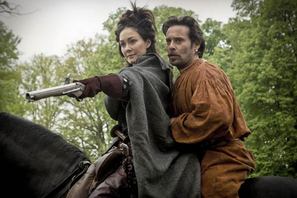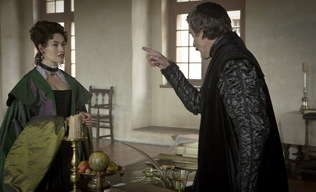
In this week's Musketeers, our intrepid band was escorting a dodgy customer to Paris and the waiting Cardinal. But, as luck would have it, a lot of Europe wanted to kill him. On the plus side, it had finally stopped snowing, so the musketeers got to ride through some green countryside. This week’s episode was crammed full of plot, including several daring escapes, and a lot more character work for the boys in various shades of brown (or black if you’re Athos).

And Porthos. Addressing those Telegraph commenters who took offence at a non-Caucasian actor portraying one of the musketeers, Porthos revealed that his mother had once been a slave. This meant that Emile’s real cargo was signposted early on, and was a nice reference to Alexandre Dumas’ father (the son of a slave, who became a high-ranking general in the French army). Slavery and colonialism is something very few Musketeers adaptations touch on, despite the time period. Here, it was mentioned in terms of its human cost, the capitalist way of viewing people as commodities, and the possibility of using these plantations and colonies to increase international power.
This serious tone is slightly ruined by how comedic Bonnaire’s comeuppance feels. Of course he was never going to get away with his plan – that’s slightly dark for a Sunday night TV show – but tricking him into sailing away with the Spanish after a fake fight was a bit slapstick. Casting James Callis as Bonnaire was a great choice, bringing all the swagger and charm the character needs in order to be likeable. After all, if he was just evil, it would be boring and we would have seen it all before.

This episode has its own theme, outside of that. Did you notice all the ships? The episode started on the docks, with Emile swaggering along, and ended up with him stumbling onto a boat back to Spain. His whole enterprise revolved around ships, whether it was the ships he used to defraud his business partner or the slave ships he wanted to build. And then there was the king, building his model ship while asking the Cardinal why he couldn’t have a navy. That kind of coherency throughout an episode, in such a subtle way, is what might help lift The Musketeers above being just a fight-of-the-week show.
But it is starting to rely on a few tropes. Chief among these is the use of fake sex, seen last week in d’Artagnan’s explanation of Constance as his mistress, and this week in Emile’s escape plan. d’Artagnan showed a bit of genre savviness and laughed at the suggestion of leaving a prisoner unattended, even if was to have sex. But no-one else seemed to take this as a serious threat (yes, OK, they did go and wait for him in his cart, so maybe it was more of a kindness thing? Just in case he really did want sex before he went?). Maybe a British audience is expected to assume that the French really are just obsessed with sex.
Next week on The Musketeers, the Cardinal and the Captain have a secret, which is going to make Aramis really annoyed. And Constance’s breasts get another airing.

 RSS Feed
RSS Feed
